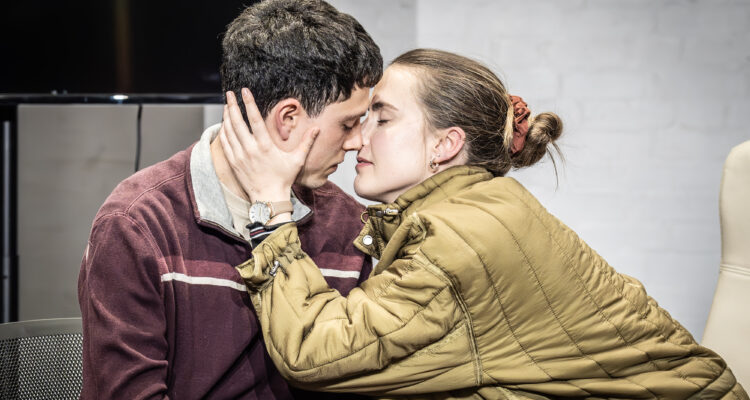In a nondescript training room for aid workers about to be sent to a conflict zone in north Africa four people set about trying to understand the challenges of being a ‘medical provider.’
The realities they face are having to deal with demands of bribes to get aid through, forming attachments to the refugees (or ‘Primary Actors’ as the jargon goes) and what to do when a patient with a history of ‘trauma, self-harm and suicidal ideation’ comes into your medical centre.
The clearly depicted characters are Dan who is boorish and career-orientated; Nicki the instructor who is brightly trying to hold her personality together against the demands of her life; Sarah is emerging from a toxic relationship (something which rather a lot of aid workers have in common); and Khaled, an Arab who is ever-sensitive to assumed cultural slights and is conflicted about his relationship to the aid programme and to Sarah.
We cut between the chat of the meal deals and falafel wraps of the workers to roleplay of how to deal with a pregnant teenager in a tent where sexual abuse is suspected.
Multiple Casualty Incident, appropriately played in the barn-like atmosphere of The Yard Theatre, achieves a claustrophobic sense in the training room while at the same time opening up into the huge, imagined landscape of desert, tents and the crowded roads of the relief station.
This is partly done by characters literally stepping off stage into the darkness when they begin a role play; and video monitors expanding their features as they film each other during training. The filming exercise acts as a magic mirror where sometimes what we are seeing on screen is not life in the training room but the realities in the refugee camp.
As the play progresses Sarah, girlishly and sensitively played by Rosa Robson, moves closer towards a relationship of affection and misunderstandings with Khaled. He is trying to process the death of his father. This is contrasted with the experience of a refugee who does not even know if his father is dead and keeps looking for him.
This comes to a point in the awkward coupling of Khaled and Sarah where Khaled comes to blur into his alter-ego, a refugee called Ali. Is she having sex with Khaled or Ali? Is his father dead or is Ali himself dying?
There is some good, snappy dialogue here but not enough humour or evidence of the genuine enthusiasm that goes with work in conflict zones. The one character who tries to keep upbeat is Dan whose clumsy masculinity is off-putting.
The play lacks a character arc for anyone except the instructor who is plagued by family responsibilities which she decides to jettison in favour of going back to the field as an aid work supervisor. No one else seems to gain anything from the experiences the play depicts and Khaled is notably absent at the end. It is not clear why he has left.
This play has its heart in the right place but where is its head? What is it saying about work in conflict zones? At one time there is a discussion about the ‘right people’ to be doing aid work but the answer is that they are all flawed, venal and vulnerable by turns, just like the refugees they help.
Until 8 June
Time: 2 hours 5 minutes plus a 20 minute interval
Playwright: Sami Ibrahim
Director: Jaz Woodcock-Stewart
Cast: Luca Kamleh Chapman, Rosa Robson, Peter Corboy, Mariah Louca
Picture credit: Mike Brenner

